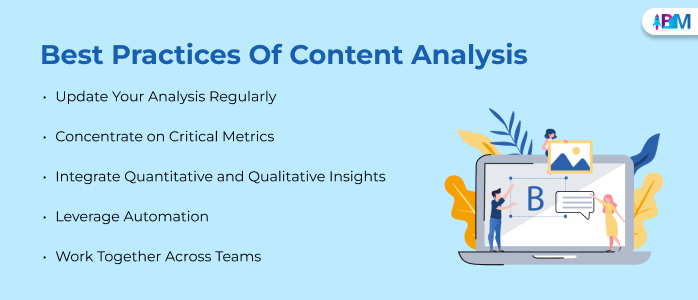Content is king in the present digital world. Companies and marketers constantly create huge amounts of content to connect with consumers, establish their brands, and increase sales. But just producing content is insufficient—it’s also critical to comprehend its impact and performance. This is where content analysis sweeps in.
The technique of methodically assessing and interpreting material to determine its efficacy and improve the next tactics is known as content analysis. To help you get the most out of your content strategy, we’ll review the significance of content analysis and methodologies, tools, and best practices in this extensive guide.
Table Of Contents
‣What is Content Analysis?
‣Why is Content Analysis Important?
‣Steps to Conduct an Effective Content Analysis
‣Content Analysis Tools
‣Best Practices of Content Analysis
‣Wrapping Up
What Is Content Analysis?

Content analysis is a research approach that interprets and codes textual data to create reproducible and accurate assumptions.
By methodically assessing content, you may measure patterns and trends in it, which will provide insights into how well your communications are working.
This process includes classifying the content, calculating the frequency and importance of different parts, and interpreting the findings to make data-driven decisions.
Why Is Content Analysis Important?
Content analysis is vital for the growth and long-term success of companies. Find out why:
(i) Improves Content Quality
Knowing which of your content will resonate with your audience and which will not, will help you determine what parts of it to share with them.
Recognizing effective content can enhance your strategy to continuously create excellent, captivating content that enthralls your audience and gets results.
(ii) Boosts Audience Engagement
One of the most significant ways to increase audience engagement is to know their preferences and behaviors.
By customizing your content to your audience’s requirements and interests, content analysis helps you establish more meaningful connections and enduring bonds with them.
(iii) Enhances SEO Efforts
Examining how well your content performs in search results offers insightful information about search trends and keyword performance. Optimizing your content in light of these findings may raise your website’s exposure and ranks and increase the organic traffic it receives.
(iv) Informs Future Strategies
Future content development initiatives are guided by data-driven insights from content analysis. By identifying successful concepts and emerging trends, you may modify your approach to seize chances and avoid past errors, guaranteeing sustained growth and financial security.
Steps To Conduct An Effective Content Analysis
Here are the steps you need to take to conduct a content analysis that resonates with your target audience:
(i) Establish Your Goals
The first step in obtaining insightful information from your content analysis is to precisely identify your goals.
Whether your objectives are to improve audience behavior, boost engagement, maximize SEO, or assess campaign efficacy, having well-defined goals can help you focus your investigation.
(ii) Choose Your Content
Select the sections of your content that correspond with your goals. This might include a variety of formats, including emails, videos, social media updates, and blog articles.
Choosing pertinent information guarantees that your research offers takeaways that are customized to your objectives.
(iii) Establish A Coding Strategy
A thorough coding strategy must be developed for efficient content organization and analysis for efficient content organization and analysis. Your code framework should include themes, subjects, emotions, keywords, and other pertinent information.
Accurate analysis is made easier with a thorough coding scheme that records the nuances of your information.
(iv) Collect Data
After gathering the chosen content, classify and tag the various pieces using your coding system selected.
Depending on the amount and complexity of the information, data collection may be done manually or with automated technologies. Gathering information creates the foundation for a thorough study.
(v) Analyze The Data
Review the coded data for trends, patterns, and insights. Apply statistical techniques to measure your results and obtain a more comprehensive comprehension of your material’s effectiveness. Analyses can provide useful insights that help you make strategic decisions.
(vi) Interpret And Report Results
Summarize the results of your analysis and turn them into relevant information. Present the data in a way that makes the most significant information stand out using graphs, charts, and visualizations.
Effective reporting of your findings guarantees that stakeholders may make wise decisions based on the analysis’s findings.
Content Analysis Tools
Check the different tools you can use to successfully conduct content analysis:
- Google Analytics: Google Analytics is an effective tool for website content analysis. It provides comprehensive information on user behavior, traffic sources, and content performance, assisting you in determining what appeals to your target audience.
- BuzzSumo: BuzzSumo lets you examine how well your content performs on various social media networks. It aids in optimizing your social media strategy by highlighting the most popular material, influential users, and trending subjects.
- SEMrush: With tools for content analysis, SEMrush is an all-in-one SEO tool. It assists you in tracking the search engine ranks of your material, identifying high-performing keywords, and examining the content of rivals.
- Ahrefs: Offering thorough content analysis, Ahrefs is another powerful SEO tool. Its insights regarding backlinks, content performance, and keyword rankings may enhance your SEO efforts.
- Tableau: This data visualization application may help you efficiently analyze and present your content data. It converts complicated data into dynamic, clear visual representations.
Best Practices Of Content Analysis

You now know what content analysis is, why it is important, and how you can conduct one. Let’s check out the best practices of content analysis that will boost your SEO efforts.
(i) Update Your Analysis Regularly
In a constantly changing digital environment, it’s critical to maintain the relevance of your content analysis. By routinely updating your study, you may identify new patterns, track variations in performance, and modify your approach.
By taking a proactive stance, you can ensure that your content stays sensitive to shifting market conditions and in line with your objectives.
(ii) Concentrate On Critical Metrics
For content analysis to be effective, it is essential to identify and prioritize critical metrics. Focusing on the most pertinent metrics, such as social shares, conversion rates, and engagement rates, can help you learn a lot about your content’s performance.
With this focused attention, you can maximize impact and make well-informed judgments by optimizing your plan.
(iii) Integrate Quantitative And Qualitative Insights
Combining quantitative data with qualitative insights is necessary to grasp the subject thoroughly. While qualitative analysis adds context and a deeper understanding, quantitative measures offer quantifiable results.
By combining the two forms of data, you can find hidden patterns, derive useful insights, and make wise decisions that lead to success.
(iv) Leverage Automation
You may greatly increase productivity and streamline workflows by integrating automated technologies into your content analysis process. Automation handles large quantities of data and analytical techniques and decreases manual labor.
By utilizing automation, you may speed up analysis work, concentrate on important projects, and provide more precise and reliable outcomes.
(v) Work Together Across Teams
Effective content analysis necessitates cooperation across several teams within your organization. Engaging stakeholders in marketing, social media, SEO, and content development allows you to take advantage of a variety of viewpoints and skill sets.
Cross-functional cooperation makes sharing insights, coordinating priorities, and integrating plans across departments possible. This cooperative strategy maximizes the influence of content analysis on overarching corporate goals and promotes synergy.
Wrapping Up
Content analysis is an essential tool for improving your content strategy. Through methodical content evaluation, you may increase engagement, obtain insightful knowledge, optimize SEO, and foster long-term company success.
By implementing best practices and effectively using available resources, you can make data-driven decisions and produce content that genuinely connects with your audience. Your content strategy will succeed if you embrace content analysis as an ongoing activity.
Read Also:
